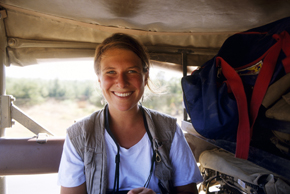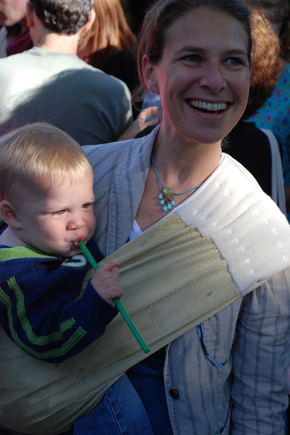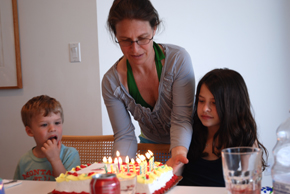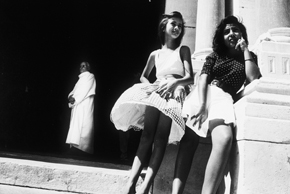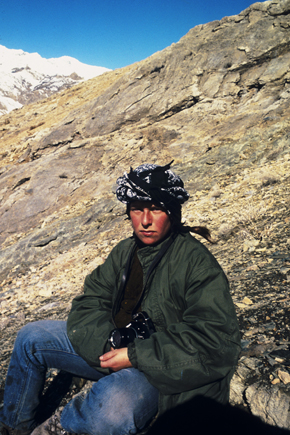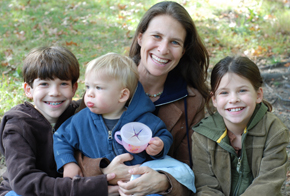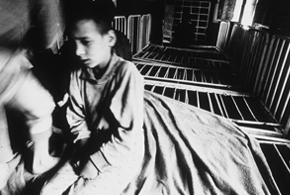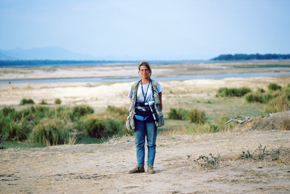Shutterbabe
I read Shutterbabe the first year I worked at CNN. I was fresh out college with my journalism degree in tow, drowning in a newsroom pool of brilliant minds and it couldn’t have come at a better time–I was an incredibly small fish in a vastly deep pond, struggling to swim. An ex-boyfriend brought the book over, along with a stack of others on our first date. Sounds promising, but I assure you, the book was the best thing out of the relationship.
Since reading it, I’ve likely lost, loaned, or gifted at least 20 copies. It’s just such a great read. I’m beyond thrilled to interview Deborah Copaken Kogan, the author of (among other titles) Shutterbabe.
danapop (dp) How did the idea for Shutterbabe transform into it actually being published? What was your writing process like?
Deborah Copaken Kogan (dck) The whole process, in retrospect, was weirdly easy and lightening fast, especially compared with my second effort, the novel ‘Between Here and April’, whose finished manuscript was rejected 39 times. (While ‘Shutterbabe’ was an instant bestseller, ironically ‘BH&A’ has sold more books over the course of its life, 59,000 to date.)
I took a leave of absence from my job as a producer from Dateline NBC to see if I could actually sit down and write my memoirs of my career as a war photographer from start to finish, something I’d been wanting to do for years. The first day, I went to a coffee shop to sit and think about how to approach it and wound up writing the entire outline, pretty much in its final form, on a napkin. (I then transferred my notes to a small moleskin notebook.) This was back in May of 1998, when my husband and I shared an old desktop computer, so I didn’t have a laptop on which to work. A few weeks of long-hand writing later, realizing I wouldn’t be able to work at home on our one computer—my older kids were 1 and nearly 3, and we lived in a tiny 1 ½ bedroom apartment—I purchased a cheap laptop and started writing at my friend Maia’s apartment on the 3 days a week I had babysitting. (We couldn’t afford to have full-time care once I left Dateline, as my salary, at that point, made up the bulk of our income.)
I wrote the first chapter in a month, and a book proposal within a few weeks of that. I then asked my friend Tad’s then-girlfriend, Courtney, a book editor, to give it a read to see if I was on the right track. She gave me verbal notes while I was on vacation with my family that summer and then provided agent recommendations. I sent the sample chapter and proposal off, via snail mail (remember, this was 1998) to the five agents she suggested. Three came back wanting to represent it, two declined. I picked the agent who seemed the most passionate. She had me edit the first chapter and expand my proposal from 3 pages to 15. She sent it out to publishers, and within days I had a book contract with Villard, who’d made a pre-emptive bid. By that time, my eldest had just started his first year of preschool on the Columbia University campus, so I would drop him off in the morning and write in the Teacher’s College Library, after finagling a library pass from a kind librarian. I wrote three days a week for about a year, then four days, then five—using my advance to pay for extra babysitting—and handed in the manuscript on my then-youngest’s 3rd birthday, March 2, 2000.
Looking back on that era of dial-up internet and few distractions, I realize what a perfect bubble of concentration I had. (Oh, to go back to those twitter-free days!) I would just sit down at 9 AM, when the library opened, and write like a demon until it was time to pick up my kids or relieve the babysitter, whichever applied to that particular day.
dp Did you find the writing of Shutterbabe to be cathartic? What did getting the story out there add to your life? Was there backlash?
dck Writing ‘Shutterbabe’ was not only cathartic, it was life-changing. I’d never had a proper creative writing class in high school, and in college I was rejected from the one creative writing class offered on campus, so I saw myself as a talentless hack. But a talentless hack with a real, untapped desire to write nevertheless. I found joy in getting it all down on paper, once I finally committed myself to the task. I taught myself by trial and error how to write, and the process started me down two important roads: 1) being a full-time, self-employed, self-sustaining author; 2) getting into therapy to deal with the demons unearthed while writing the first book.
There was an awful backlash not really to the book or to the writing itself but to me as a person, mostly from other women, and I would be lying if I said it didn’t hurt at the time. I was young, sensitive, and this was my first time putting myself out there. I was maligned, with equal venom, as either a slut or a stay-at-home mother, neither of which were either relevant to a book review or true. One particularly malicious reviewer, who’d never reviewed a book prior or since, accused me, libelously, of sleeping my way into stories, which was the exact opposite of my professional conduct as a journalist. (The one time I was propositioned by a corrupt official in Zimbabwe charged with connecting me with my story, who said he’d only help me if I would sleep with him, I wound up having to hire a plane and find my way into the jungle and story myself.) This journalist also wrote the following kind of absurd bit of hearsay in her review, quoting her own friend: “’Maybe no one liked her,’ a friend of mine suggests.”
Thankfully, a few readers—all of them strangers to me—wrote in to criticize both the review and reviewer, one of which I’ll quote directly here, as it summarizes quite well what I felt at the time: “It saddens me to read an article like this one,” she wrote, “where one woman takes the opportunity to pick apart and criticize another woman’s behavior for not being ‘feminist’ enough. How ironic that R_____ accuses Kogan of harming the feminist agenda by emphasizing her sexual escapades — in fact it is R_____ who is undermining feminism by proving once again that it is competitiveness and cattiness, not solidarity, that rules relationships among women. I wish that women like R_____ would realize their own role in perpetuating a world of ‘boys’ clubs’ and double standards — until they do, there is not much hope for true equality among the sexes.”
Yes, I had many lovers prior to meeting my husband at the age of 24—we will have been together 20 years this April 20th—but not only was I not ashamed of my sexual history, I was glad that I’d had a chance to experience a variety of different partners before finding my life mate. As for being a stay-at-home mother—one reviewer called me a “lactating nester shut-in with babes”—this was such an odd thing to say of someone whose bestselling book one was reviewing. Yes, the book ends as I leave my job at Dateline, but I’d always simply assumed the reviewer would realize what I’d been up to, workwise, by virtue of the well-remunerated product in his or her hands. I wonder if any male authors have been called stay-at-home dads.
dp Newsrooms in general are pretty crazy entities and unless you’ve worked in one, you’ll never fully grasp it. That said, I remember looking around the one I worked in thinking, “there’s no way I can have a successful career here and have a baby”…I now know it’s not so black and white and plenty of my former colleagues are managing just fine, but you sort of had that same feeling, right? How did you balance it then? Now?
dck I quit covering wars before I had kids, knowing that the two would be incompatible to the type of parenting I wanted to provide. Plus my job as a photojournalist kept me on the road for months at a time, and this was no good for my relationship with my husband either. I gave birth to my two eldest children while working full-time at Dateline, taking 6-month, unpaid maternity leaves with each, and though I traveled a lot when I went back to work after each leave, it was always for 2 or 3 days at a time, maximum, and it was manageable up to a point. I ended up leaving Dateline a year and a half after giving birth to my second child, when NBC refused my request to work 4 days a week, but also because my work there had lost its luster. I was doing fluff pieces, not the news I’d signed up to do, and I couldn’t justify spending hours away from my young children doing work that I was ashamed of doing. I hear that after my strongly-worded exit interview—I said something like, “Mothers are the most efficient workers I know, and you’re about to lose all of them”—part-time work for new parents at NBC became the norm rather than the exception.
Writing long-form—books, magazine articles—has been a revelation to me: difficult, yes, in all sorts of ways, but also fulfilling and meaningful. I now do it 5 days a week, from 8:30 to 4:30 every day, and sometimes I wake up early on the weekends to write before the kids get up. I think the secret to work/life balance for parents, no matter if we’re talking mothers or fathers, is simply liking one’s work and choosing at least one spouse among the two whose work can be somewhat flexible.
dp I find the process of writing to be hard enough without huge distractions (bar the dog needing to be let out ever so often), how do you write around your family’s schedules?
dck My older kids, now 14 and 13, are on their own these days, traveling back and forth to school and activities on the subway themselves, so it’s only really our 3 year old we have to worry about during work hours, and my solution to that has been to put him in full-time, 9-5 daycare, which most other civilized countries provide to their citizens either for free or with excellent government subsidies that render the cost negligible. I was never comfortable with the whole nanny culture, even though our first babysitter was wonderful. It just didn’t sit well with me. It’s personal, a gut instinct, and I can’t explain it more succinctly than that. Our youngest loves his daycare so much, when I pick him up at 5, he often begs to stay until 6, when many of his other friends get picked up. That to me says everything. He’s socializing, he’s learning his letters, his numbers; he’s doing art and playing music and running around outside and having a ball, and I don’t have to worry about the daycare calling in sick. That being said, I do have to worry about my son calling in sick, and on those days, yes, I plant him in front of a DVD while I write, checking up on him with fluids and medicine every hour or so. If he’s sick, he’s usually asleep by the middle of the movie anyway. Great parenting? Probably not. But he’s happy, he’s resting comfortably, I get my work done, and I don’t sweat it.
We have a dog, too. Without him, I’m not sure I’d ever leave our house, so I’m grateful for the midday distraction. My daughter walks him after school, bathes him and feeds him. This was part of our deal when we got him, that she’d be responsible for at least half of his care.
All of this being said, yes, there are plenty of days when the family and its needs impinge on my schedule. My children’s vacations are not synchronized, for one, and someone’s always getting sick. But I’ve done enough therapy and yoga and have lived long enough and been a parent long enough to be Zen with it all. I try to write 500 words a day. Some days I crank out 1000. Others I have to make do with 300. That’s life.
dp The entire time I read Shutterbabe, I felt like it was a movie playing out – did Darren Star buy the movie rights? Is a movie version in development? What does that all that mean for you as the author?
dck Darren did buy the rights, and we had a fantastic research trip to Paris on Dreamwork’s dime, but it never came to fruition. Then another producer, Scott Landis, took over. Now, the book is being produced by Likely Story (a production company run by the wonderful Anthony Bregman and Stefanie Azpiazu) for Evan Shapiro at the Sundance Channel. As it stands now, it will be a TV miniseries of 6 hour-long segments, all of them set in Afghanistan. If the show does well, the next season will cover a different conflict/love affair, and so on and so forth. The planned premiere of this show, as of now, is sometime in 2011.
dp I liked the title of the book, a lot–since you focus so much on the dualism of the profession and all that entails with being a woman. Was that the original title?
dck No, the original title was Newswhore. Which I still love, but nobody else did or does. Then it was Photogirl. Then Develop Stop Fix. Ironically, the head of the Sundance Channel, Evan Shapiro, came up with Shutterbabe as we were dropping off our eldests at preschool. At the last second, I had a change of heart, and wanted to change it to Shuttergirl, but Ann Godoff, then the head of Random House, prevailed, and it came out as ‘Shutterbabe’. I was never comfortable with the whole “babe” thing, but it’s alliterative to “bug” (Shutterbug), and everyone else liked it, so I went along, begrudgingly. The title’s grown on me now. I can’t imagine it as anything else.
dp I read that you actually wanted to be a writer and work in magazines; do you think photography found you?
dck Definitely. I had to take an extra studio class to do a major in film in college, and I took photography, and the rest is history.
dp Is that your calling (photography)? Writing? Both? Is the creative force behind them different?
dck Oh, god, do I have to answer this? I still shoot every day. I write every day. I find each feeds the other in this weird left brain/right brain symbiotic way. On my tax return, I have to list myself as writer/photographer, since I earn money as both. Does that answer your question?
dp What is your proudest accomplishment?
dck Personally, my children and my 20-year partnership with their father. Professionally, my books. Don’t ask me to choose between the two, however, because each balances out the other. But for the sake of argument? Let’s just say that when a new book of mine arrives in the mail, bound and ready to go out into the world, I get excited, but not nearly as excited as I did seeing each of my children’s faces for the first time.
Sappy? Yes. But true.
dp How does living in Manhattan influence the way you think and see the world? How has traveling impacted your work?
dck I just moved to Harlem last summer, and it’s a dramatic change from the more antiseptic Upper West Side, where we used to live. I love our new neighborhood, its laid-back vibe, its entrenched neighborliness. I’m fascinated both by it history as an enclave of African American creativity and by its recent transformation from a place no one wanted to live to a place families of all nationalities and colors are claiming as their own. Can I see it appearing in future works? Definitely. As for living in Manhattan in general, it’s a left-leaning, melting-pot, rambunctious, creative, fast-paced, cosmopolitan city, which is a place I feel comfortable. Psychologically comfortable, that is, not physically comfortable, because we can’t really afford to live here, and we’ve never really been able to afford to live here, and yet, here we remain, hanging on white knuckled, hoping the rent checks don’t bounce. Perhaps I enjoy the daily struggle to survive more than my complaining about it would suggest.
As for all the traveling I did for my job as a photojournalist, it made me who I am. I try to look at all conflicts from both sides, be they personal, professional, or international. I try to comprehend the news and our world on a global scale, with the thrust and buttress of history behind it. I try to see all the shades of gray. This transfers over to my writing, definitely, and into the themes I’m interested in exploring.
dp I also read that one of your sons is a working actor. How do you juggle that–emotionally as well as logistically and what does that mean for your own career?
dck It just adds another scoop of career ice cream on top of my own. My son does not have a manager, so I do the managing. Meaning, mostly I just read and say no to a lot of film scripts that come in, so he can stay in school and remain grounded, but when something comes up like ‘Star Trek’ or a chance to star in a film like ‘Joshua’ or working on an indy film shooting in the summer, I weigh how it will affect the rest of the family, how it will affect his schoolwork (if at all), and then allow him to explore this side of himself that’s been bursting just under the surface since the get-go. (Acting was something he wanted to do at a very young age, and I had to be convinced, slowly.) Also, he’s old enough now (nearly 15) that he can work on his TV show, ‘Delocated’, without me having to leave my desk to be his guardian on set. I just appoint a PA as his guardian, and my son travels to set either on his own, or, if the shoot is in a place other than Manhattan, he’s picked up in a van.
Meanwhile, as I was in the middle of writing this, I was just interrupted by a text from my son, wanting to know which subway to take to today’s audition, so there you have it. He’s independent, but he still needs Mom to tell him how to get from here to there. Maybe if I suck it up and buy him the iPhone he’s been begging for, he can use the subway app and then the map app as his surrogate mother. Hmmm….
dp Do you see your career in shifts or compartments in regard to your personal life?
dck Definitely. I wish someone had told me this back in college.
dp How often do you shoot photographs now? Do you still shoot on a Leica?
dck Now that I have an iPhone, I shoot every day, constantly. It’s an addiction, actually. Then I use an app called TIltShiftGen on them. Very cool app. I still have my Leica and a medium format Mamiya 330 given to me by an old beau, and sometimes I dust them off and shoot black and white film, but I mostly I shoot with a digital Nikon (D80) these days, which was a Hannukah present from my parents and my parents-in-law, who were tired of the lame digital images of their grandchildren I was taking with my lame digital camera.
dp What aspects do you think the blogging industry has added to the writing process?
dck There’s a lot of verbal noise out there now, and sometimes I think it’s too loud. I sound like a dinosaur, I know, but I sometimes long for the pre-twitter, pre-blog days. Then, every once in awhile I’ll read a blog post that blows me away, and I immediately see the merits. Plus, it gives everyone a voice who wants to have one, and I’m all for the democratization of voices.
dp Shutterbabe and Hell is Other Parents are both non-fiction, how did your novel Between Here and April differ? Was fiction used as a protection tool?
dck Fiction is a completely different beast from non-fiction, because everything is made up. It flexes different muscles. It’s much more dreamy and subconscious. And no, it wasn’t a form of protection, but rather the only form, I felt, for me to really write a true crime story with no witnesses. I had to get into the heads of the perpetrator. And there’s no way to have done that with non-fiction. Plus I wanted to make it an allegory of Dante’s ‘Inferno’, and real life rarely presents itself in allegorical form.
dp What’s next for you? Are there projects or areas of your work and life you’d like to focus more attention on?
dck I’m working on a new novel. It was due last week, but here I am, answering your questions instead of working on it. I’m really excited by the new book, though, and I’m plugging away as fast as I can. However, I don’t want to jinx it by talking about it just yet. I’m about a third of the way through. I’ve been writing a few scripts as well, both TV and film. I’d like to see where that takes me. I also want to move back to Paris at some point, but I might have to wait until at least the older kids are in college. If my husband and I ever reach a point of true financial solvency (ha!), I might take some time off to learn a new skill, like painting or guitar. I’d like to direct a film one day, like my idol and friend, Nora. I want to ride a bike across Europe. I’d like to live long enough not only to meet my grandchildren, but to really enjoy them. I’d like to see Bali again before I die.


